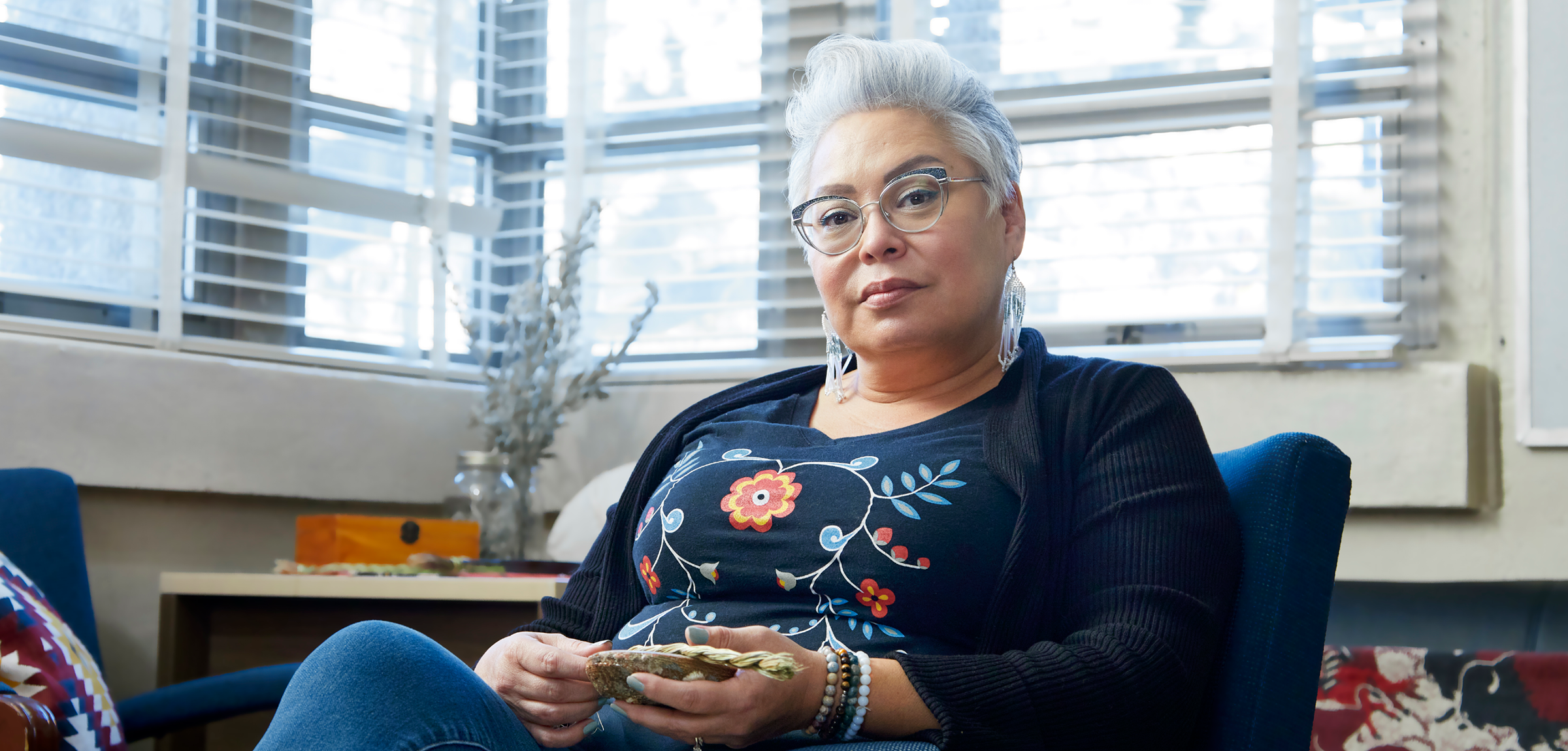It’s an unseasonably warm night in March 2007. Janis Weasel Bear is struggling to process the sudden death of her father, whom she only met when she was in her 20s, 12 years earlier.
Now she’s sitting at a picnic table in his Pincher Creek backyard, contemplating his life — and her own. As stars spread across the sky, a conversation unfolds.
“I know that you’re grieving right now, but I think this is time for you to be selfish,” says a voice on
her phone.
The voice belongs to a colleague who is encouraging Weasel Bear to apply for a liaison job that’s just opened up.
“You really need to think about what’s the next step for you,” the voice says.
Weasel Bear is unsure. She’s worried about being restrained by colonial systems that don’t always respect marginalized people.
Growing up disconnected from her father, learning he was a residential school survivor, she’s grappled with identity her whole life and wants to find somewhere she belongs.
But beneath her grief and uncertainty, there’s excitement. This job could be an opportunity to uplift Indigenous voices and help her community.
“I really felt that because I had skills and passion and an education, then I needed to use that,” she says.
‘How are you doing?’
That moment 15 years ago led Weasel Bear to her current role, well-being strategist for Indigenous education at the Calgary Board of Education (CBE). It’s a career path she never foresaw, despite always feeling like a natural teacher, because her own experiences as a young student were hardly inspiring.
School was a refuge from home, where she experienced socio-economic barriers and challenging family dynamics, similar to what many of her students now encounter. So she withdrew and coasted along, quietly miserable at school and unsafe at home.
“I remember wishing that somebody would notice or ask me, just once, 'How are you doing?’” Weasel Bear says.
She also didn’t feel a sense of belonging in the Western–Euro world that surrounded her while she was being raised by her non-Indigenous mother.
Weasel Bear knew her father was Indigenous. The word conjured up Hollywood stereotypes: the stoic native, the noble savage. Combined with stories about her father that were tarnished with negativity, this perception of her heritage left Weasel Bear feeling ashamed.
"I remember [...] not wanting to acknowledge my Indigeneity," she says. "But deep down inside, I was so curious."
Her curiosity didn’t subside with time, and in 1995 — now a young adult — Weasel Bear reached out to her father. He was part of the Piikani Nation of the Blackfoot Confederacy, and in him she found a confidant. Their relationship became very close as she finally embraced her Indigenous roots.
Their conversations shaped Weasel Bear’s life even after he died in 2007. By then, she was the director of Indigenous programs and services for YMCA Calgary. Though she loved the nonprofit, it frequently required that she work evenings and weekends, and paid an income that didn’t allow her to meet her financial goals, such as becoming a homeowner or travelling
for pleasure.
Her dad had helped her realize that, while material
rewards weren't her priority, her well-being was. So she went for the job opening at CBE and applied her passions to the role of Indigenous education liaison, determined to empower Indigenous voices and help people understand the legacy of residential schools.
Unlocking learning
Several years later, Weasel Bear had the opportunity to get her education degree through a program that funded Indigenous professionals employed by school boards to become teachers. She didn’t leap at the chance; the commitment needed to make a positive difference as a teacher was daunting.
“I didn’t know if I had it, honestly,” she says.
But she realized that an education degree would enable her to take on leadership roles at the CBE and create more change. With that in mind, Weasel Bear became a teacher in 2013. Since then, she’s worked tirelessly to improve students’ understanding — and confidence.
“It’s not about how well they perform on the tests,” she says. “It’s about how they feel about their learning and how valued they feel.”
She remembers a Grade 6 class that was nervous about using lockers at junior high, so they played relay games to practice opening combination locks. One student, after many failed attempts, threw his lock down and stormed away.
Later, Weasel Bear sat with him to try again. He spun the dial. Nothing but frustration.
“One moment he’s like, ‘This is so dumb, I’ll never figure this out,’ and then click! It popped open,” recalls Weasel Bear. “The look [...] was absolute, child-like joy on this face [...] that was always so street-smart and so tough.”
These days, Weasel Bear isn’t always teaching in a classroom. The CBE restructured its Indigenous education team in 2020, and Weasel Bear started a new role: well-being strategist.
She played a key part within a larger team in designing a draft of a well-being framework for Indigenous students. At Forest Lawn and Jack James high schools, which have two of the highest proportions of Indigenous students in Calgary, she puts theory into practice, improving staff development and supporting students with cultural teachings and land-based learning.
Her passion for the work is evident, says Nan Balkwill, Forest Lawn’s Indigenous education strategist. “She comes in with just such generous, positive energy.”
Though, for much of her life, a sense of belonging has not been easy for Weasel Bear to find, she has no doubt that she belongs in education, creating a better system for Indigenous learners and caring for students’ well-being so they can be successful.
“That’s my heart,” she says. “That’s what I [want to] do for the rest of my life.”
Got an idea? In Profile features an interesting teacher in each issue of the ATA Magazine. If you know of a teacher who would be a good profile subject, please contact managing editor Cory Hare at cory.hare@ata.ab.ca.
